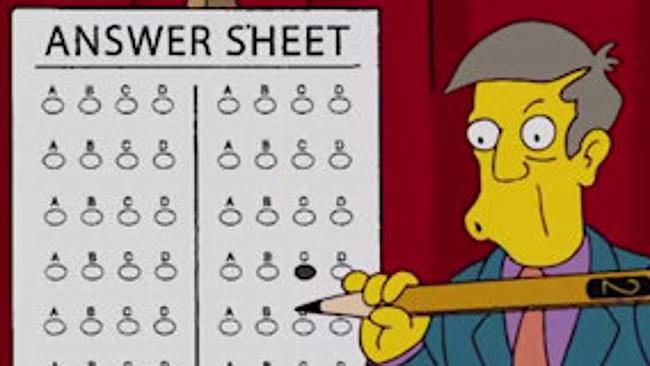Extrovert or introvert? It’s actually not that simple
MANY people have a huge fascination with tests like these. Here’s why taking them is a total waste of your time.

THERE’S this new trend on dating apps in which people list their personality quiz results in their profiles.
If you’re a Tinder user who occasionally glances at a prospective partner’s underwhelming description before you swipe right or left, you may have noticed it.
It’s those weird four-letter acronyms, which might read something like ‘ESTJ’ or ‘INFP’.
These are results of the Myers-Briggs Type Indicator, the most widely-used personality test in the world. For decades, companies and employers have administered tests like these - including the ‘DISC’ test and the 16PF Questionnaire - to “assign” a personality type to job candidates.
And now, evidently, they’ve even wormed their way into the smartphone dating universe.

In Myers-Briggs, the most common test, users are asked 93 questions which involve self-assessing everything from how tidy their workspace is to how outgoing they feel around new people.
At the end of the test, you receive your four-letter “profile” and a personality summary which places you in one of 16 “boxes”, describing everything from how you make your decisions to the type of person you’re best suited to romantically.
The test has gained a massive cult following online. The internet is filled with forums where people intricately debate which “type” celebrities are, or else take to Reddit to question whether their relationship with their “opposite-typed” partner can work.
But here’s the thing: while the test is used by employers, employees and prospective Tinder dates alike, experts have argued it lacks psychological accuracy. Its inventors, mother-daughter pair Katharine Briggs and Isabel Briggs-Myers, had zero formal training in psychology or sociology.
So just how meaningful are they?
According to Doctor Peter Jonason, a Senior Lecturer in Personality or Individual Differences at Western Sydney University, they aren’t meaningful at all.
Speaking to news.com.au, he said tests like Myers-Briggs and DISC are problematic and lacking in psychological accuracy.
He said they’re basically a product of people’s need for labelling and sorting those around them into boxes (which could explain the popularity of all those meaningless Buzzfeed quizzes you secretly indulge in).

Modern personality psychologists, on the other hand, view human beings as more complicated than “either/ors”. Everything takes place on a much more open scale.
“If I say someone’s a psychopath, I mean they score high on measures of psychopathy,” he explained. “But everyone has some measure of mutual exclusivity. It fits with people’s simplistic thinking of the world, and makes it easy for us to put people into boxes.
“I took the Myers-Briggs test in high school and it told me an ideal job for me would be a priest. Little did it know I was a raging atheist.”
Presenting you with your ideal “career” is a key part of the test.
According to one online career profile for the ENFP type, for example, more than 100 “recommended careers” were listed, ranging from actor to journalist to midwife to substance abuse counsellor. In other words, careers which are vastly different from one another.
Dr. Jonason likened it to astrology. “It’s deliberately vague,” he said. “If they throw enough stuff at you, eventually you’ll find a match.”
He also said that, because the Myers-Briggs test has traditionally involved paying money for your results, people are more likely to think it’s better.
CPP, the private company that publishes Myers-Briggs, reportedly brings in roughly $20 million a year. (There are free versions you can take online, which claim to be the test, but ultimately they are variants or adaptations.)
“It labels people because that’s easier to deal with, rather than saying ‘This person scored such-and-such’,” said Dr. Jonason.

Overall, he said there are too many variables to consider when we’re talking about personality. For example, we exhibit classic “extrovert” traits in some scenarios and typical “introvert” traits in others.
“But that doesn’t sound as pretty as saying ‘This person is an extrovert.’”
For example, where the Myers-Briggs test might suggest extroverts pursue a career in media, and introverts a career in science, Dr. Jonason might instead argue that someone who scores high in narcissism shouldn’t go into a career consisting of low prestige and status.
Psychologists today are more likely to focus on the Big Five personality factors - openness to experience, conscientiousness, extroversion, agreeableness and neuroticism - and say we all fit into each and every one on a fluid scale.
In other words, you can’t just chuck someone into a box to define them.
Ironically, Carl Jung, the Swiss psychologist who inspired Myers-Briggs model, was against the idea of boxing people into one category.
He was once quoted as saying: “Although there are doubtless individuals whose type can be recognised at first glance, this is by no means always the case.
“However simple and clear the fundamental principle of (separate personality types) may be, in actual reality they are complicated and hard to make out, because every individual is an exception to the rule.”

Companies today still distribute the test. According to CPP, 89 companies on the US Fortune 100 list still make use of it to some degree.
They say it can be used to assign more efficient training models to different types of people, or group employees according to how their “types” will work best together in a group setting.
But the Myers & Briggs Foundation itself acknowledges its limitations, writing on its website: “It is unethical and in many cases illegal to require job applicants to take the Indicator if the results will be used to screen out applicants.”
As a Tinder descriptor, it’s really just a bit of fun, and it certainly beats the usual tired Marilyn Monroe quotes we seem to read in every second bio.
But don’t take it too seriously. After all, at the end of the day, humans are pretty darn complicated.



